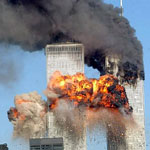Understanding what Bin Laden's death means
Academic experts, a war veteran, and a student whose father died on 9/11 talk about the meaning of Bin Laden's death.

SMU Student:
More ‘Relieved’ Than Happy
DALLAS (SMU) — The news of Osama Bin Laden’s death at the hands of an elite force of U.S. Navy Seals holds special significance for SMU student Christina Rancke: Her father perished in one of the World Trade Center Towers on September 11, 2001.
While the terrorist leader’s death was celebrated across America, Rancke didn’t find joy in the news. “I felt more of an overwhelming relief — mainly that he’d been found,” says the second-year undergraduate student working toward a degree in corporate communications. Her extended family shared the news through numerous telephone calls, e-mails and texts before and after President Obama’s televised address late Sunday.
“We’re definitely not celebrating, though,” she says. “We’d never celebrate the death of individual. Especially since nothing can ever bring my father back.”
Her father, A. Todd Rancke, was only 42 when he was killed at work on the 104th floor of the South Tower, where he served as managing director of the financial firm Sandler O'Neill & Partners. After the first plane struck the North Tower, her mother, Debbie, spoke with Todd and was relieved that he was OK.
“I just remember my family surrounding the TV,” says Rancke, then living in Summit, N.J. “Everyone was worried, but my dad told my mom he was all right and not to worry,” she says. “That was the last time they got to talk.”
Rancke is helping plan SMU’s 10th anniversary 9-11 commemoration with SMU’s Cary M. Maguire Center for Ethics and Public Policy.
Tower Center Diplomat Robert W. Jordan:
After Bin Laden – What Next?
The sudden killing of Osama Bin Laden in Pakistan jolts us all into a complex mixture of emotions, memories and conclusions. Nearly all of us remember where we were on September 11, 2001. Others remember hoping that Bin Laden would be quickly captured or killed. And some of us recall working with brave men and women dedicated to hunting him down, denying him access to terrorist financing, and dealing with the ideological cesspool that he so viciously promoted.
Just four weeks after the attacks of September 11, while the ruins of the World Trade Center were still smoldering, I landed at night in Riyadh to take charge of my mission as the new U.S. Ambassador to Saudi Arabia. As I entered the terminal from the 22-hour plane trip, I met my new, heavily armed Saudi bodyguards. Were they friend or foe? Most of the hijackers who had killed nearly 3,000 Americans on 9/11 were Saudis. Osama Bin Laden was their leader and inspiration. What was I facing?
Professor Ben Voth:
A Rhetorical Bookend
At 11:30 Eastern time on May 1, President Obama announced the official news of a rumor spreading like wildfire on the internet: Osama Bin Laden is dead. He was killed in a firefight with US forces outside Islamabad. The United States has possession of his body.
The announcement is something of a rhetorical bookend to a 10-year saga that began on September 11, 2001. The death of Bin Laden is an important juncture for examining the rhetorical significance of his life and our own struggles to make meaning of Bin Laden's actions. Read more.
# # #